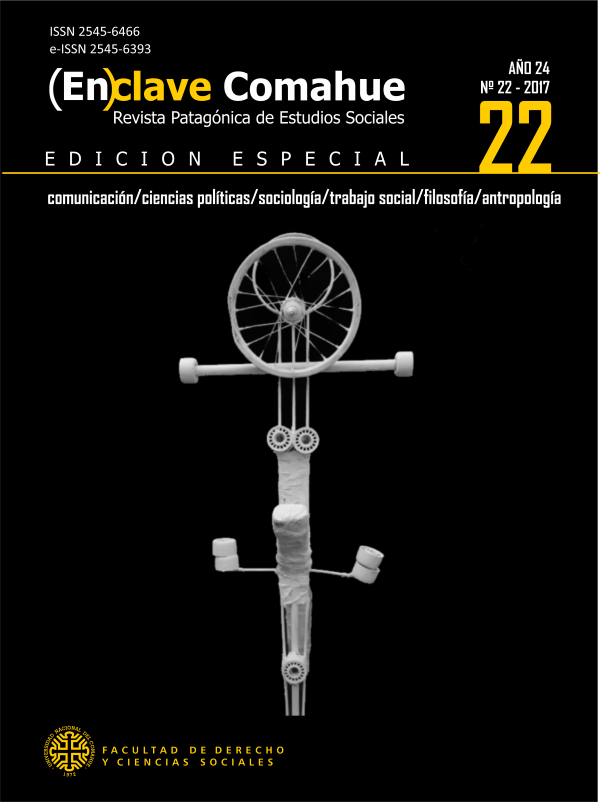La utopía, un (no)lugar tan incómodo / Utopia: that awkward (no)place
Palavras-chave:
Utopía, Ideología, MarxismoResumo
A 500 años de Utopía de Tomás Moro, consideramos que vale la pena detenerse en una noción que –aunque esquiva por momentos– vuelve una y otra vez a las reflexiones de la teoría política; nos proponemos examinar una noción que parece negada desde su propia etimología: por definición, la utopía señala un “no lugar”. En primer lugar, veremos cómo desde la difusión de la magnífica obra del pensador londinense que dio fama al término, la utopía remite a algo que está fuera de lugar; en segundo término analizaremos la utopía cuando se considera un proyecto a futuro, en tanto horizonte de sentido. Con relación a esto, nos proponemos vincular la crítica a la noción de utopía y la crítica al concepto de ideología, para establecer por qué en las últimas décadas hablar de utopía nos lleva a un lugar incómodo. Para ello, tendremos en cuenta los aportes que desde el marxismo realizan Fredric Jameson –que propone al género utópico como subgénero de la ciencia ficción– y Terry Eagleton, teniendo en cuenta que desde el triunfo del neoliberalismo como modelo económico y el postmodernismo como (su) modelo cultural, la discusión sobre modelos alternativos fue bloqueada por los discursos del fin de la historia.
ABSTRACT
Five hundred years after Thomas More’s Utopia, we believe that it is worth analyzing a notion that, although often seems elusive, returns to the reflections of Political Theory once and again. We propose to examine a notion that seems denied by its own etymology: by definition, utopia means “no place”. First, we will see how since the spreading of the magnificent work of Moro, who brought fame to the term, utopia refers to something that is out of place; secondly we shall consider utopia as a future project. Besides, we will refer to a possible relation between the critique of the notion of utopia and the concept of ideology, in order to define why in the last decades the topic of utopia leads to an uncomfortable place. In this effort, we will consider the contributions by Marxists Fredric Jameson –who proposes the utopian genre as a subgenre of science fiction– and Terry Eagleton, in the belief that neo-liberalism –as an economic model– and postmodernism –as (its) cultural logic– have blocked the discussion of alternative models by the discourses on the end of history.
Downloads
Referências
Eagleton, Terry. (2000). Utopia and its opposites. Socialist Register, vol. 36, 31-40.
________ (2000). Defending Utopia. New Left Review, 4, July August, 173-176 .
________(2005). Ideología. Una introducción. Barcelona: Paidós.
________(2006). ¿Un futuro para el socialismo? En A. Boron, J. Amadeo y S. González (Comp.) La teoría marxista hoy. Problemas y perspectivas (pp.463-471). Buenos Aires: CLACSO
________(2012). Figuras de disenso. Ensayos críticos sobre Fish, Spívak, Žižek y otros autores. Buenos Aires: Prometeo.
Lizárraga, Fernando. (2012). Estudio preliminar. En F. Engels, Del socialismo utópico al socialismo científico. Buenos Aires: Luxemburg.
________(2016). Marxistas y liberales. La justicia, la igualdad y la fraternidad en la teoría política contemporánea. Buenos Aires: Biblos.
Moro, Tomás. (2000 [1516]). Utopía. Madrid: Alianza.
Simon, Ed. (2016). Five Hundred Years of Utopia. Jacobin, [online] 19/04/16 Recuperado de
https://www.jacobinmag.com/2016/04/thomas-more-utopia-socialism-progress-wilde/
Downloads
Publicado
Como Citar
Edição
Seção
Licença
Los autores de los artículos publicados conservan los derechos de autor y garantizan a la revista el derecho a ser la primera publicación. Los autores podrán adoptar otros acuerdos de licencia no exclusiva de distribución de la versión de la obra publicada (p. ej.: depositarla en un repositorio institucional o en sus sitios personales) siempre que se indique la publicación inicial en esta revista.
Los artículos se publican bajo la licencia de Creative Commons Reconocimiento-NoComercial-CompartirIgual 4.0 Internacional, mediante la cual se permite copiar, reproducir, distribuir, comunicar públicamente la obra y generar obras derivadas, siempre y cuando se cite y reconozca al autor original. No se permite utilizar la obra ni sus posibles obras derivadas con fines comerciales.
ACLARACIÓN: En números anteriores al año 2017 se utilizó la licencia Creative Commons BY-NC-ND para la publicación de los artículos.







